Business Ethics Report: Worker Rights in Australian Fashion Industry
VerifiedAdded on 2022/11/26
|10
|2120
|66
Report
AI Summary
This report examines the unethical practices of Australian fashion brands concerning worker rights. It highlights the exploitation of workers within the supply chain, including poor working conditions, inadequate wages, and disregard for basic human rights. The report discusses the lack of transparency, the failure of corporate governance, and the prioritization of profit over worker welfare. The analysis delves into the application of ethical theories such as utilitarianism and deontology to understand the ethical implications of these practices. The report emphasizes the need for Australian fashion brands to improve worker conditions, implement ethical business policies, and adhere to corporate governance to ensure fair treatment and a safe working environment for all workers involved in their operations. The report also suggests the need for NGOs to monitor and ensure the well-being of the workers.
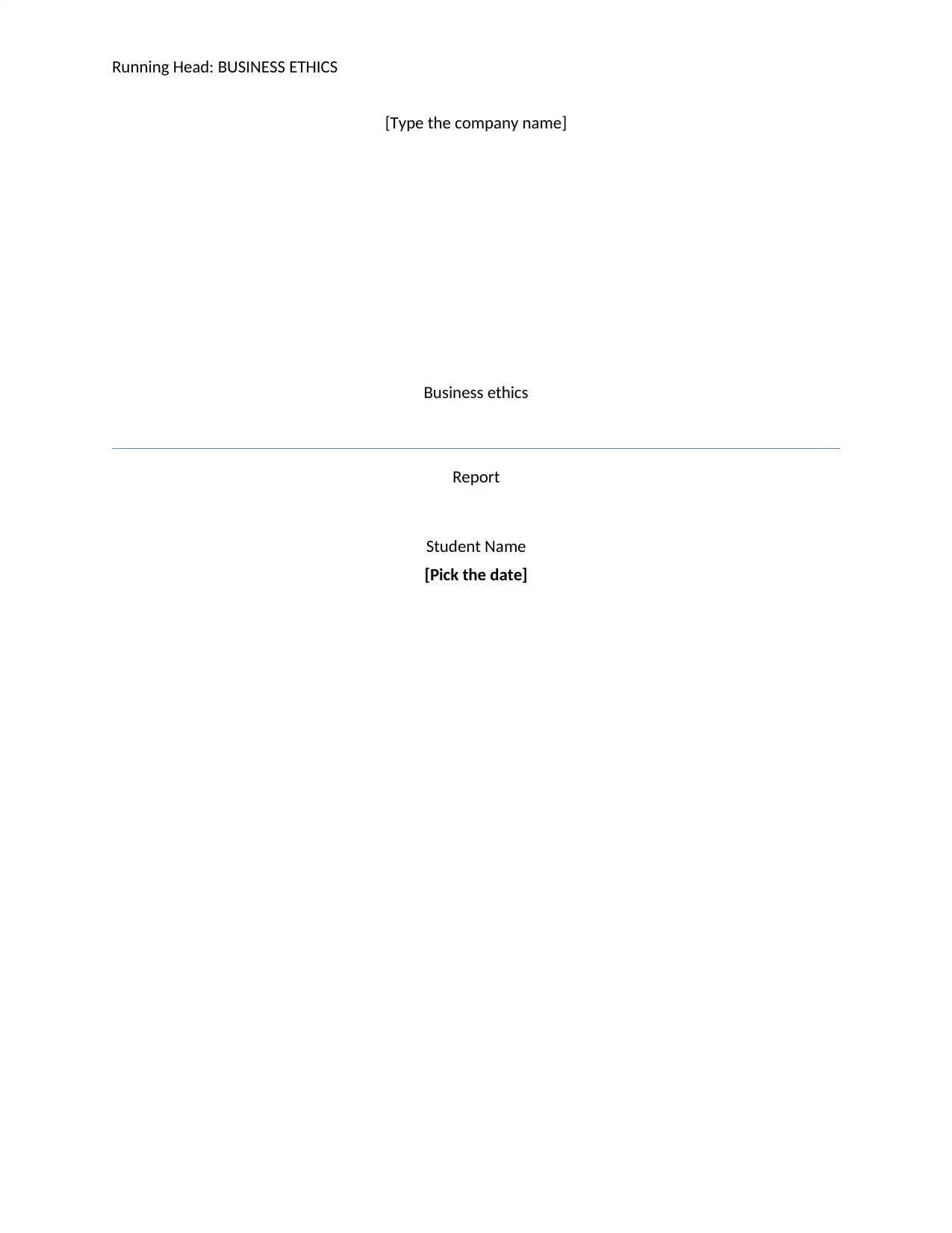
Running Head: BUSINESS ETHICS
[Type the company name]
Business ethics
Report
Student Name
[Pick the date]
[Type the company name]
Business ethics
Report
Student Name
[Pick the date]
Paraphrase This Document
Need a fresh take? Get an instant paraphrase of this document with our AI Paraphraser
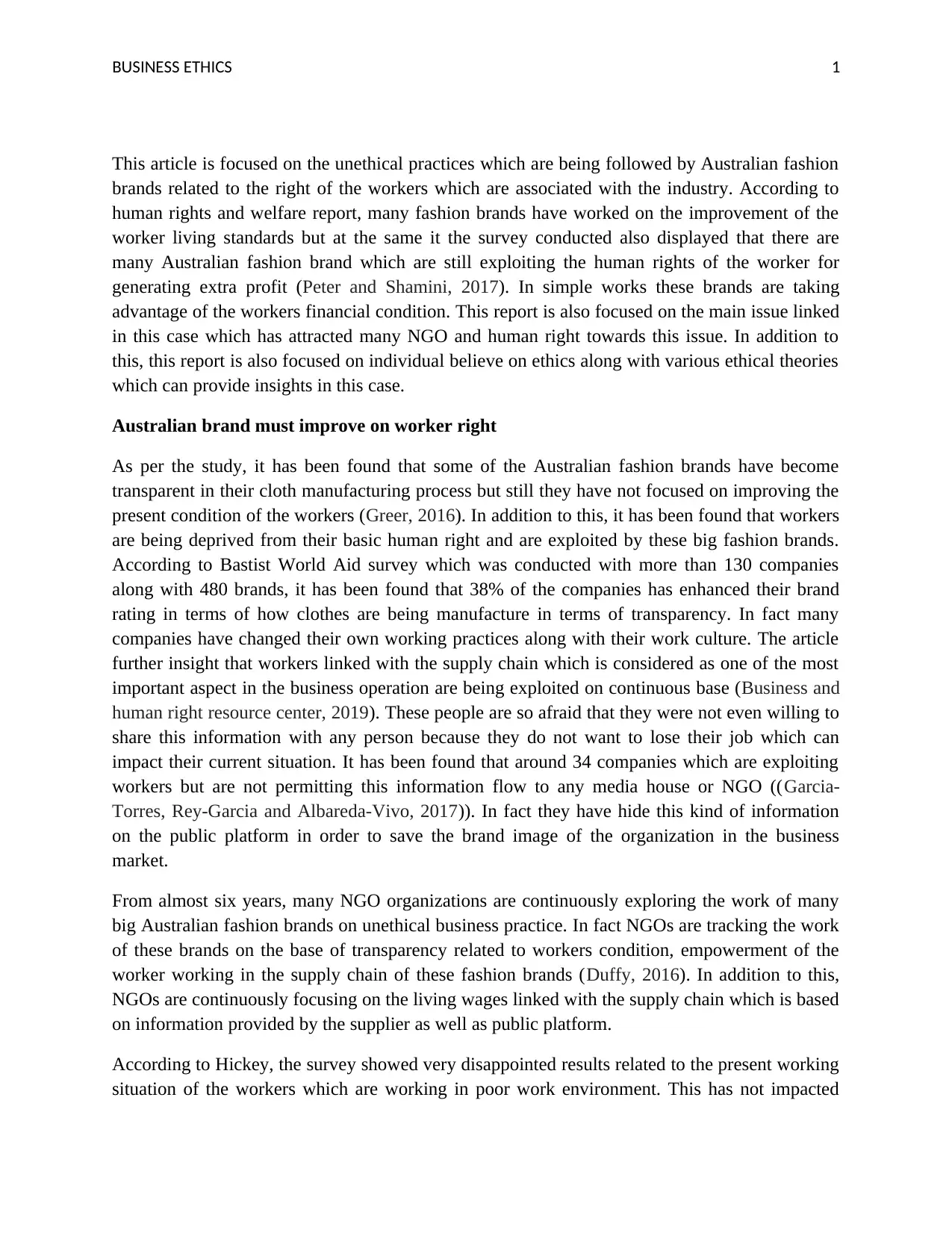
BUSINESS ETHICS 1
This article is focused on the unethical practices which are being followed by Australian fashion
brands related to the right of the workers which are associated with the industry. According to
human rights and welfare report, many fashion brands have worked on the improvement of the
worker living standards but at the same it the survey conducted also displayed that there are
many Australian fashion brand which are still exploiting the human rights of the worker for
generating extra profit (Peter and Shamini, 2017). In simple works these brands are taking
advantage of the workers financial condition. This report is also focused on the main issue linked
in this case which has attracted many NGO and human right towards this issue. In addition to
this, this report is also focused on individual believe on ethics along with various ethical theories
which can provide insights in this case.
Australian brand must improve on worker right
As per the study, it has been found that some of the Australian fashion brands have become
transparent in their cloth manufacturing process but still they have not focused on improving the
present condition of the workers (Greer, 2016). In addition to this, it has been found that workers
are being deprived from their basic human right and are exploited by these big fashion brands.
According to Bastist World Aid survey which was conducted with more than 130 companies
along with 480 brands, it has been found that 38% of the companies has enhanced their brand
rating in terms of how clothes are being manufacture in terms of transparency. In fact many
companies have changed their own working practices along with their work culture. The article
further insight that workers linked with the supply chain which is considered as one of the most
important aspect in the business operation are being exploited on continuous base (Business and
human right resource center, 2019). These people are so afraid that they were not even willing to
share this information with any person because they do not want to lose their job which can
impact their current situation. It has been found that around 34 companies which are exploiting
workers but are not permitting this information flow to any media house or NGO ((Garcia-
Torres, Rey-Garcia and Albareda-Vivo, 2017)). In fact they have hide this kind of information
on the public platform in order to save the brand image of the organization in the business
market.
From almost six years, many NGO organizations are continuously exploring the work of many
big Australian fashion brands on unethical business practice. In fact NGOs are tracking the work
of these brands on the base of transparency related to workers condition, empowerment of the
worker working in the supply chain of these fashion brands (Duffy, 2016). In addition to this,
NGOs are continuously focusing on the living wages linked with the supply chain which is based
on information provided by the supplier as well as public platform.
According to Hickey, the survey showed very disappointed results related to the present working
situation of the workers which are working in poor work environment. This has not impacted
This article is focused on the unethical practices which are being followed by Australian fashion
brands related to the right of the workers which are associated with the industry. According to
human rights and welfare report, many fashion brands have worked on the improvement of the
worker living standards but at the same it the survey conducted also displayed that there are
many Australian fashion brand which are still exploiting the human rights of the worker for
generating extra profit (Peter and Shamini, 2017). In simple works these brands are taking
advantage of the workers financial condition. This report is also focused on the main issue linked
in this case which has attracted many NGO and human right towards this issue. In addition to
this, this report is also focused on individual believe on ethics along with various ethical theories
which can provide insights in this case.
Australian brand must improve on worker right
As per the study, it has been found that some of the Australian fashion brands have become
transparent in their cloth manufacturing process but still they have not focused on improving the
present condition of the workers (Greer, 2016). In addition to this, it has been found that workers
are being deprived from their basic human right and are exploited by these big fashion brands.
According to Bastist World Aid survey which was conducted with more than 130 companies
along with 480 brands, it has been found that 38% of the companies has enhanced their brand
rating in terms of how clothes are being manufacture in terms of transparency. In fact many
companies have changed their own working practices along with their work culture. The article
further insight that workers linked with the supply chain which is considered as one of the most
important aspect in the business operation are being exploited on continuous base (Business and
human right resource center, 2019). These people are so afraid that they were not even willing to
share this information with any person because they do not want to lose their job which can
impact their current situation. It has been found that around 34 companies which are exploiting
workers but are not permitting this information flow to any media house or NGO ((Garcia-
Torres, Rey-Garcia and Albareda-Vivo, 2017)). In fact they have hide this kind of information
on the public platform in order to save the brand image of the organization in the business
market.
From almost six years, many NGO organizations are continuously exploring the work of many
big Australian fashion brands on unethical business practice. In fact NGOs are tracking the work
of these brands on the base of transparency related to workers condition, empowerment of the
worker working in the supply chain of these fashion brands (Duffy, 2016). In addition to this,
NGOs are continuously focusing on the living wages linked with the supply chain which is based
on information provided by the supplier as well as public platform.
According to Hickey, the survey showed very disappointed results related to the present working
situation of the workers which are working in poor work environment. This has not impacted
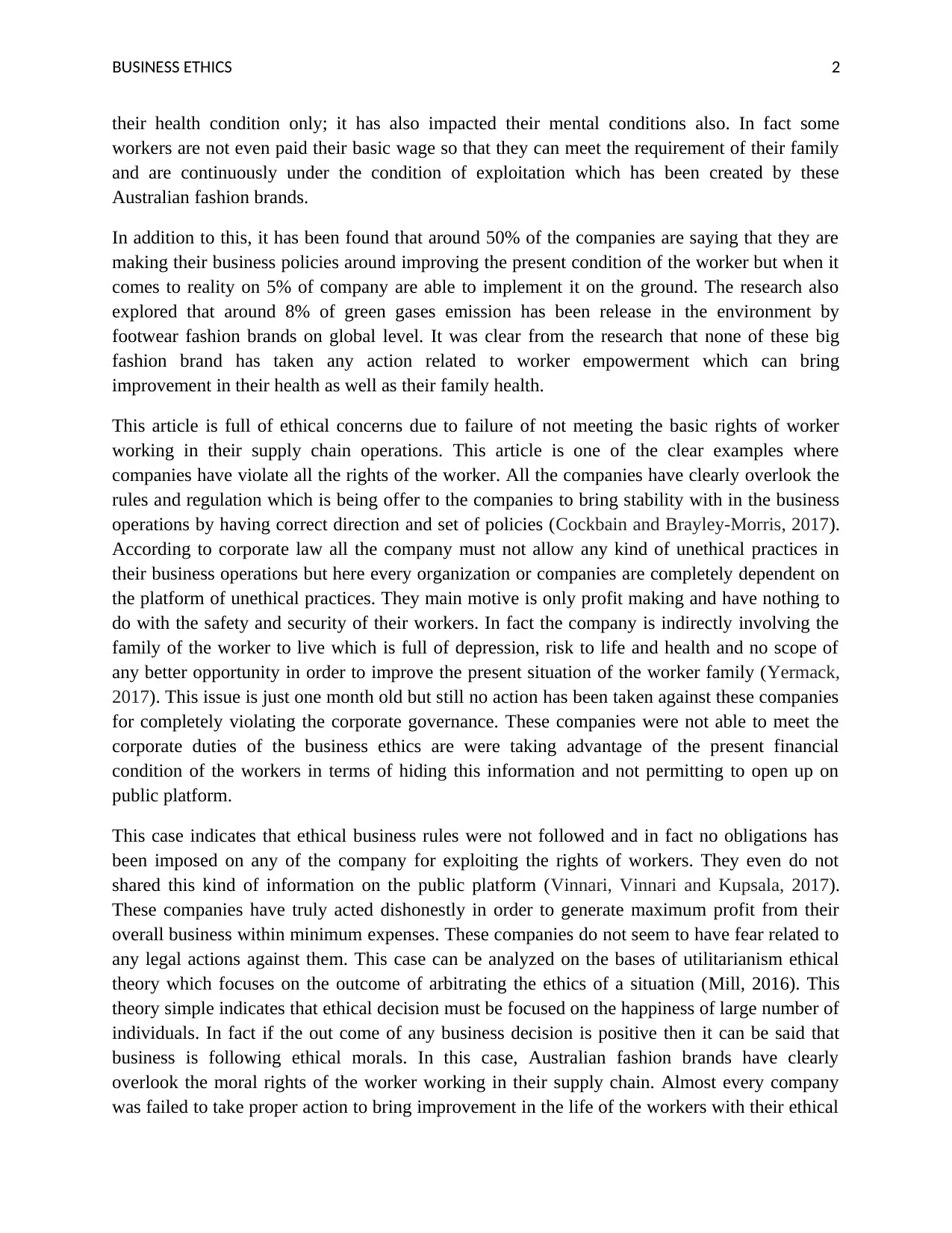
BUSINESS ETHICS 2
their health condition only; it has also impacted their mental conditions also. In fact some
workers are not even paid their basic wage so that they can meet the requirement of their family
and are continuously under the condition of exploitation which has been created by these
Australian fashion brands.
In addition to this, it has been found that around 50% of the companies are saying that they are
making their business policies around improving the present condition of the worker but when it
comes to reality on 5% of company are able to implement it on the ground. The research also
explored that around 8% of green gases emission has been release in the environment by
footwear fashion brands on global level. It was clear from the research that none of these big
fashion brand has taken any action related to worker empowerment which can bring
improvement in their health as well as their family health.
This article is full of ethical concerns due to failure of not meeting the basic rights of worker
working in their supply chain operations. This article is one of the clear examples where
companies have violate all the rights of the worker. All the companies have clearly overlook the
rules and regulation which is being offer to the companies to bring stability with in the business
operations by having correct direction and set of policies (Cockbain and Brayley-Morris, 2017).
According to corporate law all the company must not allow any kind of unethical practices in
their business operations but here every organization or companies are completely dependent on
the platform of unethical practices. They main motive is only profit making and have nothing to
do with the safety and security of their workers. In fact the company is indirectly involving the
family of the worker to live which is full of depression, risk to life and health and no scope of
any better opportunity in order to improve the present situation of the worker family (Yermack,
2017). This issue is just one month old but still no action has been taken against these companies
for completely violating the corporate governance. These companies were not able to meet the
corporate duties of the business ethics are were taking advantage of the present financial
condition of the workers in terms of hiding this information and not permitting to open up on
public platform.
This case indicates that ethical business rules were not followed and in fact no obligations has
been imposed on any of the company for exploiting the rights of workers. They even do not
shared this kind of information on the public platform (Vinnari, Vinnari and Kupsala, 2017).
These companies have truly acted dishonestly in order to generate maximum profit from their
overall business within minimum expenses. These companies do not seem to have fear related to
any legal actions against them. This case can be analyzed on the bases of utilitarianism ethical
theory which focuses on the outcome of arbitrating the ethics of a situation (Mill, 2016). This
theory simple indicates that ethical decision must be focused on the happiness of large number of
individuals. In fact if the out come of any business decision is positive then it can be said that
business is following ethical morals. In this case, Australian fashion brands have clearly
overlook the moral rights of the worker working in their supply chain. Almost every company
was failed to take proper action to bring improvement in the life of the workers with their ethical
their health condition only; it has also impacted their mental conditions also. In fact some
workers are not even paid their basic wage so that they can meet the requirement of their family
and are continuously under the condition of exploitation which has been created by these
Australian fashion brands.
In addition to this, it has been found that around 50% of the companies are saying that they are
making their business policies around improving the present condition of the worker but when it
comes to reality on 5% of company are able to implement it on the ground. The research also
explored that around 8% of green gases emission has been release in the environment by
footwear fashion brands on global level. It was clear from the research that none of these big
fashion brand has taken any action related to worker empowerment which can bring
improvement in their health as well as their family health.
This article is full of ethical concerns due to failure of not meeting the basic rights of worker
working in their supply chain operations. This article is one of the clear examples where
companies have violate all the rights of the worker. All the companies have clearly overlook the
rules and regulation which is being offer to the companies to bring stability with in the business
operations by having correct direction and set of policies (Cockbain and Brayley-Morris, 2017).
According to corporate law all the company must not allow any kind of unethical practices in
their business operations but here every organization or companies are completely dependent on
the platform of unethical practices. They main motive is only profit making and have nothing to
do with the safety and security of their workers. In fact the company is indirectly involving the
family of the worker to live which is full of depression, risk to life and health and no scope of
any better opportunity in order to improve the present situation of the worker family (Yermack,
2017). This issue is just one month old but still no action has been taken against these companies
for completely violating the corporate governance. These companies were not able to meet the
corporate duties of the business ethics are were taking advantage of the present financial
condition of the workers in terms of hiding this information and not permitting to open up on
public platform.
This case indicates that ethical business rules were not followed and in fact no obligations has
been imposed on any of the company for exploiting the rights of workers. They even do not
shared this kind of information on the public platform (Vinnari, Vinnari and Kupsala, 2017).
These companies have truly acted dishonestly in order to generate maximum profit from their
overall business within minimum expenses. These companies do not seem to have fear related to
any legal actions against them. This case can be analyzed on the bases of utilitarianism ethical
theory which focuses on the outcome of arbitrating the ethics of a situation (Mill, 2016). This
theory simple indicates that ethical decision must be focused on the happiness of large number of
individuals. In fact if the out come of any business decision is positive then it can be said that
business is following ethical morals. In this case, Australian fashion brands have clearly
overlook the moral rights of the worker working in their supply chain. Almost every company
was failed to take proper action to bring improvement in the life of the workers with their ethical
⊘ This is a preview!⊘
Do you want full access?
Subscribe today to unlock all pages.

Trusted by 1+ million students worldwide
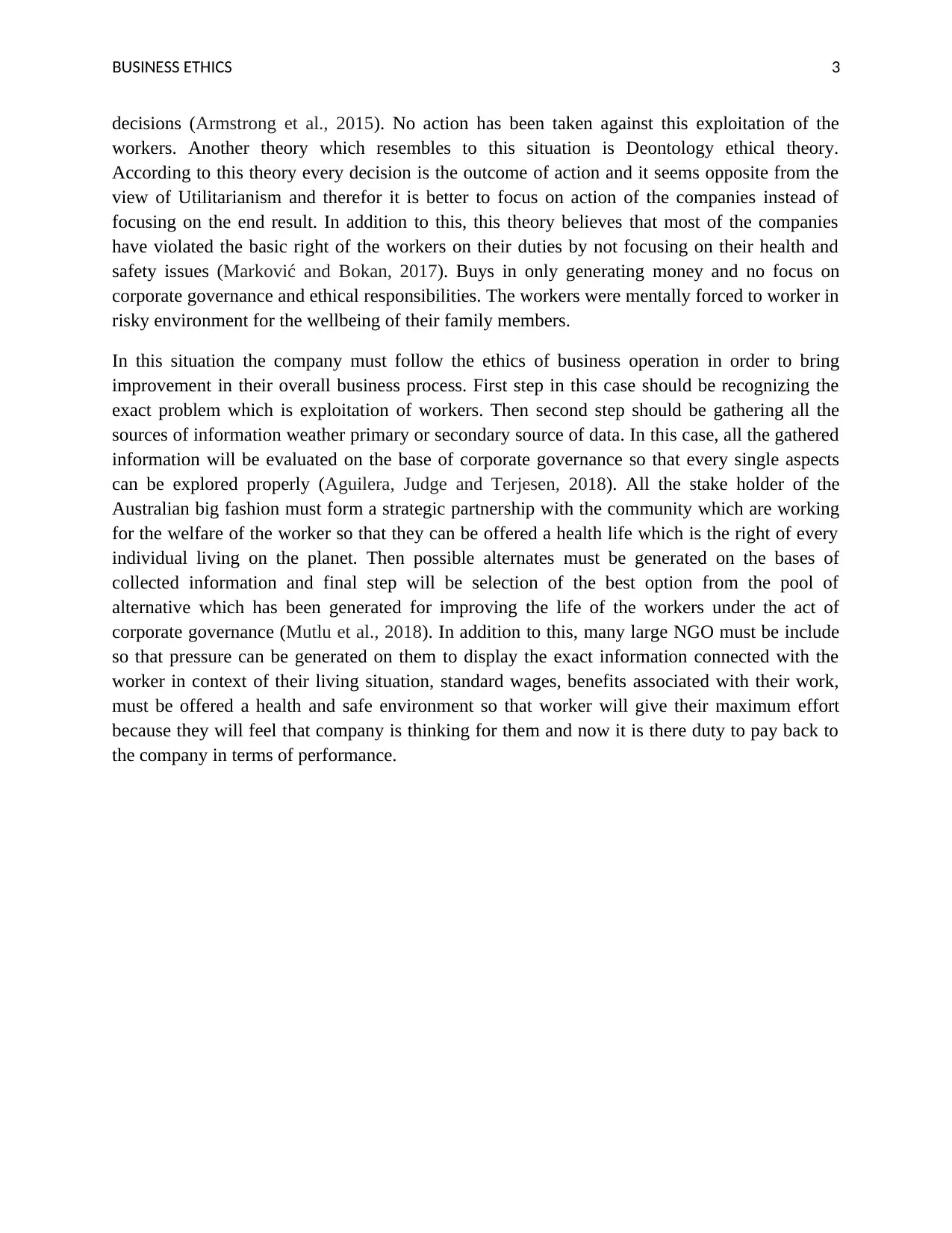
BUSINESS ETHICS 3
decisions (Armstrong et al., 2015). No action has been taken against this exploitation of the
workers. Another theory which resembles to this situation is Deontology ethical theory.
According to this theory every decision is the outcome of action and it seems opposite from the
view of Utilitarianism and therefor it is better to focus on action of the companies instead of
focusing on the end result. In addition to this, this theory believes that most of the companies
have violated the basic right of the workers on their duties by not focusing on their health and
safety issues (Marković and Bokan, 2017). Buys in only generating money and no focus on
corporate governance and ethical responsibilities. The workers were mentally forced to worker in
risky environment for the wellbeing of their family members.
In this situation the company must follow the ethics of business operation in order to bring
improvement in their overall business process. First step in this case should be recognizing the
exact problem which is exploitation of workers. Then second step should be gathering all the
sources of information weather primary or secondary source of data. In this case, all the gathered
information will be evaluated on the base of corporate governance so that every single aspects
can be explored properly (Aguilera, Judge and Terjesen, 2018). All the stake holder of the
Australian big fashion must form a strategic partnership with the community which are working
for the welfare of the worker so that they can be offered a health life which is the right of every
individual living on the planet. Then possible alternates must be generated on the bases of
collected information and final step will be selection of the best option from the pool of
alternative which has been generated for improving the life of the workers under the act of
corporate governance (Mutlu et al., 2018). In addition to this, many large NGO must be include
so that pressure can be generated on them to display the exact information connected with the
worker in context of their living situation, standard wages, benefits associated with their work,
must be offered a health and safe environment so that worker will give their maximum effort
because they will feel that company is thinking for them and now it is there duty to pay back to
the company in terms of performance.
decisions (Armstrong et al., 2015). No action has been taken against this exploitation of the
workers. Another theory which resembles to this situation is Deontology ethical theory.
According to this theory every decision is the outcome of action and it seems opposite from the
view of Utilitarianism and therefor it is better to focus on action of the companies instead of
focusing on the end result. In addition to this, this theory believes that most of the companies
have violated the basic right of the workers on their duties by not focusing on their health and
safety issues (Marković and Bokan, 2017). Buys in only generating money and no focus on
corporate governance and ethical responsibilities. The workers were mentally forced to worker in
risky environment for the wellbeing of their family members.
In this situation the company must follow the ethics of business operation in order to bring
improvement in their overall business process. First step in this case should be recognizing the
exact problem which is exploitation of workers. Then second step should be gathering all the
sources of information weather primary or secondary source of data. In this case, all the gathered
information will be evaluated on the base of corporate governance so that every single aspects
can be explored properly (Aguilera, Judge and Terjesen, 2018). All the stake holder of the
Australian big fashion must form a strategic partnership with the community which are working
for the welfare of the worker so that they can be offered a health life which is the right of every
individual living on the planet. Then possible alternates must be generated on the bases of
collected information and final step will be selection of the best option from the pool of
alternative which has been generated for improving the life of the workers under the act of
corporate governance (Mutlu et al., 2018). In addition to this, many large NGO must be include
so that pressure can be generated on them to display the exact information connected with the
worker in context of their living situation, standard wages, benefits associated with their work,
must be offered a health and safe environment so that worker will give their maximum effort
because they will feel that company is thinking for them and now it is there duty to pay back to
the company in terms of performance.
Paraphrase This Document
Need a fresh take? Get an instant paraphrase of this document with our AI Paraphraser
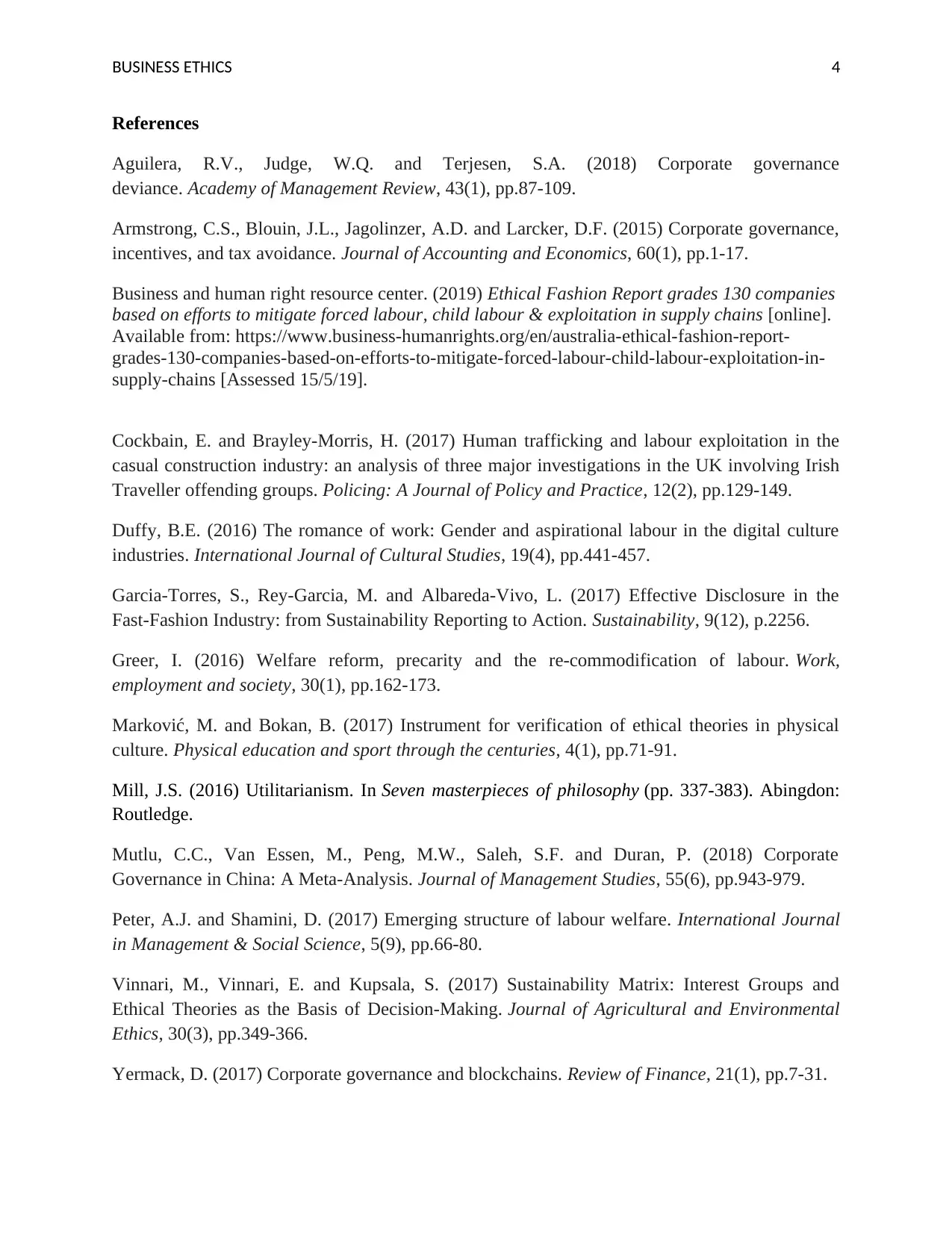
BUSINESS ETHICS 4
References
Aguilera, R.V., Judge, W.Q. and Terjesen, S.A. (2018) Corporate governance
deviance. Academy of Management Review, 43(1), pp.87-109.
Armstrong, C.S., Blouin, J.L., Jagolinzer, A.D. and Larcker, D.F. (2015) Corporate governance,
incentives, and tax avoidance. Journal of Accounting and Economics, 60(1), pp.1-17.
Business and human right resource center. (2019) Ethical Fashion Report grades 130 companies
based on efforts to mitigate forced labour, child labour & exploitation in supply chains [online].
Available from: https://www.business-humanrights.org/en/australia-ethical-fashion-report-
grades-130-companies-based-on-efforts-to-mitigate-forced-labour-child-labour-exploitation-in-
supply-chains [Assessed 15/5/19].
Cockbain, E. and Brayley-Morris, H. (2017) Human trafficking and labour exploitation in the
casual construction industry: an analysis of three major investigations in the UK involving Irish
Traveller offending groups. Policing: A Journal of Policy and Practice, 12(2), pp.129-149.
Duffy, B.E. (2016) The romance of work: Gender and aspirational labour in the digital culture
industries. International Journal of Cultural Studies, 19(4), pp.441-457.
Garcia-Torres, S., Rey-Garcia, M. and Albareda-Vivo, L. (2017) Effective Disclosure in the
Fast-Fashion Industry: from Sustainability Reporting to Action. Sustainability, 9(12), p.2256.
Greer, I. (2016) Welfare reform, precarity and the re-commodification of labour. Work,
employment and society, 30(1), pp.162-173.
Marković, M. and Bokan, B. (2017) Instrument for verification of ethical theories in physical
culture. Physical education and sport through the centuries, 4(1), pp.71-91.
Mill, J.S. (2016) Utilitarianism. In Seven masterpieces of philosophy (pp. 337-383). Abingdon:
Routledge.
Mutlu, C.C., Van Essen, M., Peng, M.W., Saleh, S.F. and Duran, P. (2018) Corporate
Governance in China: A Meta‐Analysis. Journal of Management Studies, 55(6), pp.943-979.
Peter, A.J. and Shamini, D. (2017) Emerging structure of labour welfare. International Journal
in Management & Social Science, 5(9), pp.66-80.
Vinnari, M., Vinnari, E. and Kupsala, S. (2017) Sustainability Matrix: Interest Groups and
Ethical Theories as the Basis of Decision-Making. Journal of Agricultural and Environmental
Ethics, 30(3), pp.349-366.
Yermack, D. (2017) Corporate governance and blockchains. Review of Finance, 21(1), pp.7-31.
References
Aguilera, R.V., Judge, W.Q. and Terjesen, S.A. (2018) Corporate governance
deviance. Academy of Management Review, 43(1), pp.87-109.
Armstrong, C.S., Blouin, J.L., Jagolinzer, A.D. and Larcker, D.F. (2015) Corporate governance,
incentives, and tax avoidance. Journal of Accounting and Economics, 60(1), pp.1-17.
Business and human right resource center. (2019) Ethical Fashion Report grades 130 companies
based on efforts to mitigate forced labour, child labour & exploitation in supply chains [online].
Available from: https://www.business-humanrights.org/en/australia-ethical-fashion-report-
grades-130-companies-based-on-efforts-to-mitigate-forced-labour-child-labour-exploitation-in-
supply-chains [Assessed 15/5/19].
Cockbain, E. and Brayley-Morris, H. (2017) Human trafficking and labour exploitation in the
casual construction industry: an analysis of three major investigations in the UK involving Irish
Traveller offending groups. Policing: A Journal of Policy and Practice, 12(2), pp.129-149.
Duffy, B.E. (2016) The romance of work: Gender and aspirational labour in the digital culture
industries. International Journal of Cultural Studies, 19(4), pp.441-457.
Garcia-Torres, S., Rey-Garcia, M. and Albareda-Vivo, L. (2017) Effective Disclosure in the
Fast-Fashion Industry: from Sustainability Reporting to Action. Sustainability, 9(12), p.2256.
Greer, I. (2016) Welfare reform, precarity and the re-commodification of labour. Work,
employment and society, 30(1), pp.162-173.
Marković, M. and Bokan, B. (2017) Instrument for verification of ethical theories in physical
culture. Physical education and sport through the centuries, 4(1), pp.71-91.
Mill, J.S. (2016) Utilitarianism. In Seven masterpieces of philosophy (pp. 337-383). Abingdon:
Routledge.
Mutlu, C.C., Van Essen, M., Peng, M.W., Saleh, S.F. and Duran, P. (2018) Corporate
Governance in China: A Meta‐Analysis. Journal of Management Studies, 55(6), pp.943-979.
Peter, A.J. and Shamini, D. (2017) Emerging structure of labour welfare. International Journal
in Management & Social Science, 5(9), pp.66-80.
Vinnari, M., Vinnari, E. and Kupsala, S. (2017) Sustainability Matrix: Interest Groups and
Ethical Theories as the Basis of Decision-Making. Journal of Agricultural and Environmental
Ethics, 30(3), pp.349-366.
Yermack, D. (2017) Corporate governance and blockchains. Review of Finance, 21(1), pp.7-31.

BUSINESS ETHICS 5
⊘ This is a preview!⊘
Do you want full access?
Subscribe today to unlock all pages.

Trusted by 1+ million students worldwide
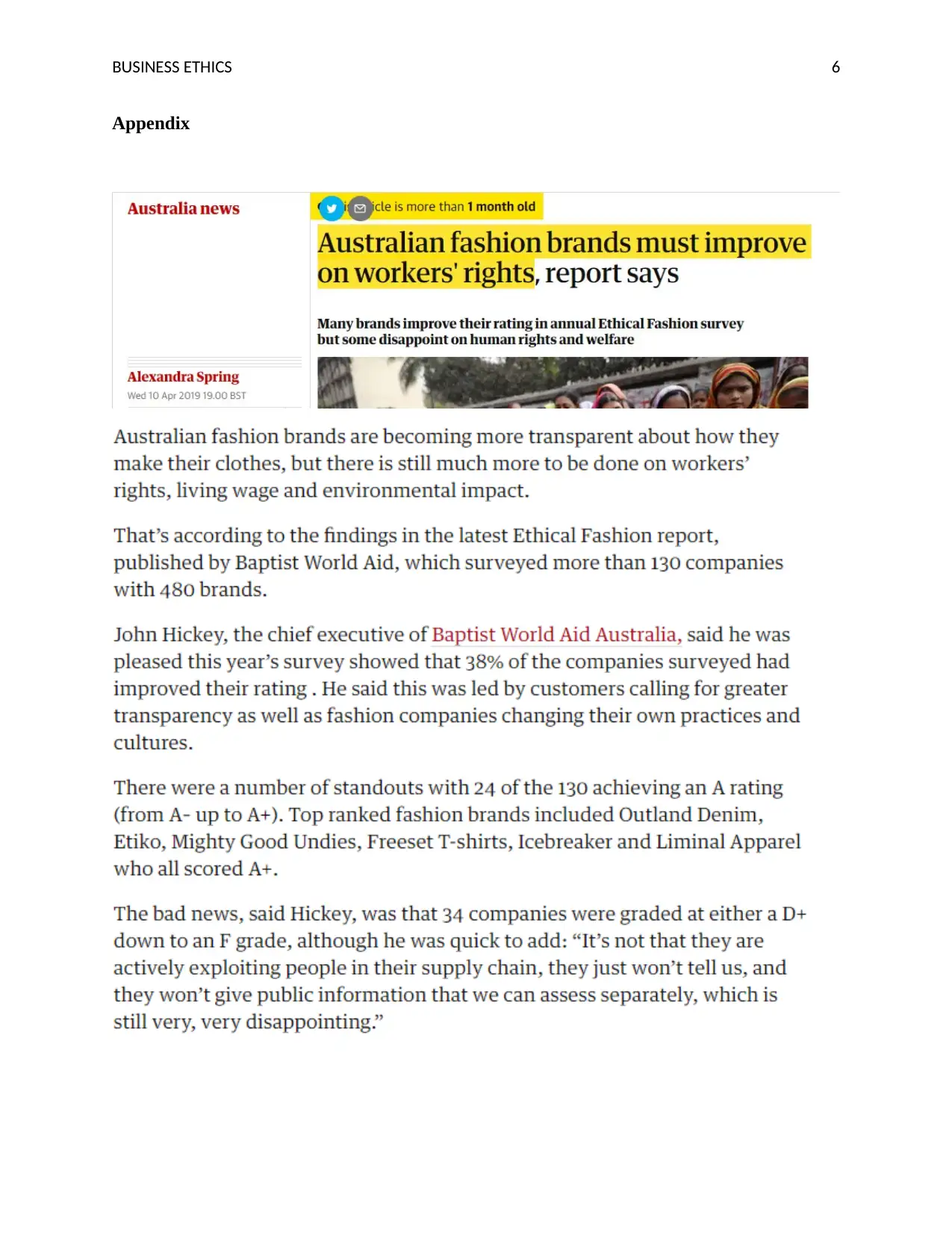
BUSINESS ETHICS 6
Appendix
Appendix
Paraphrase This Document
Need a fresh take? Get an instant paraphrase of this document with our AI Paraphraser
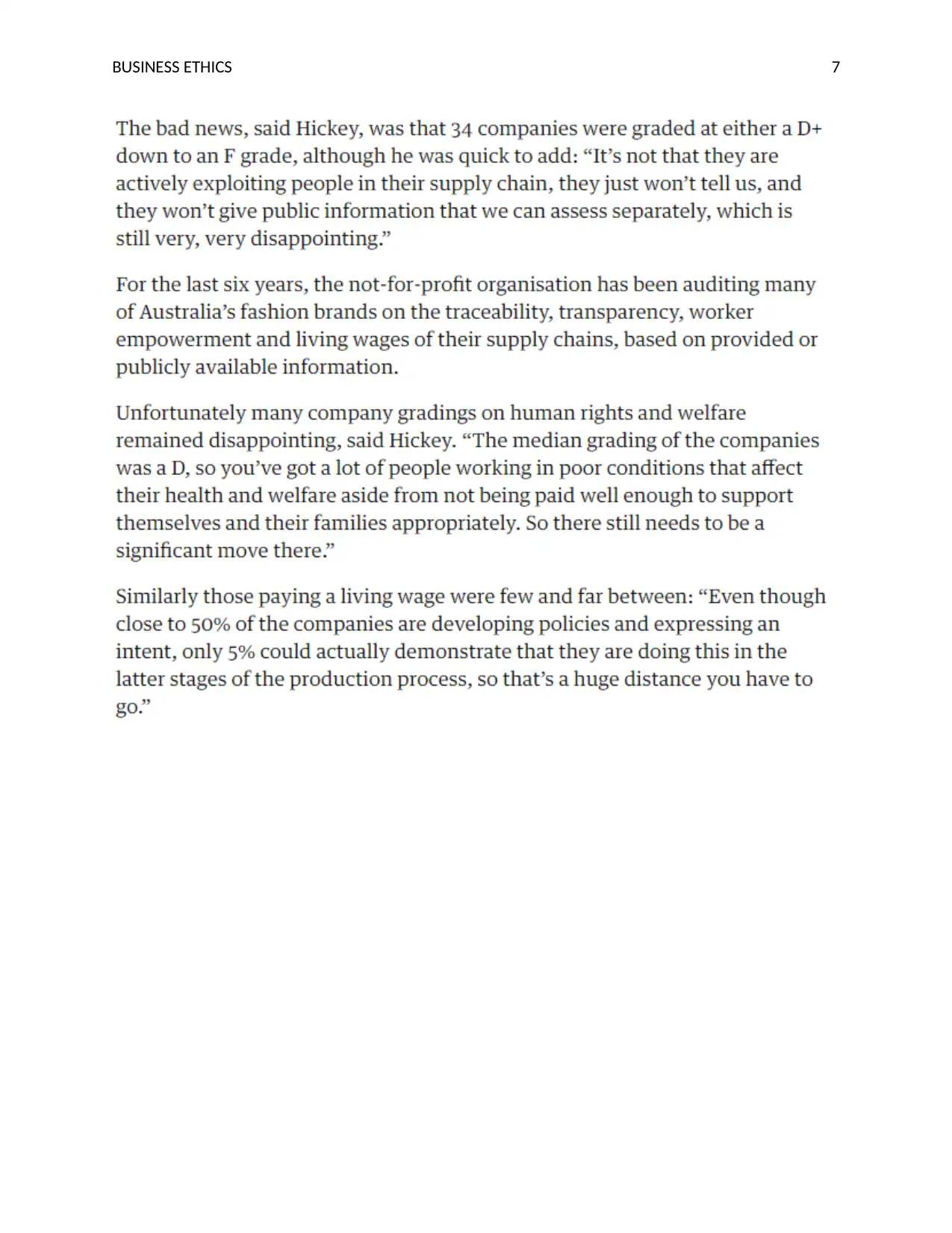
BUSINESS ETHICS 7
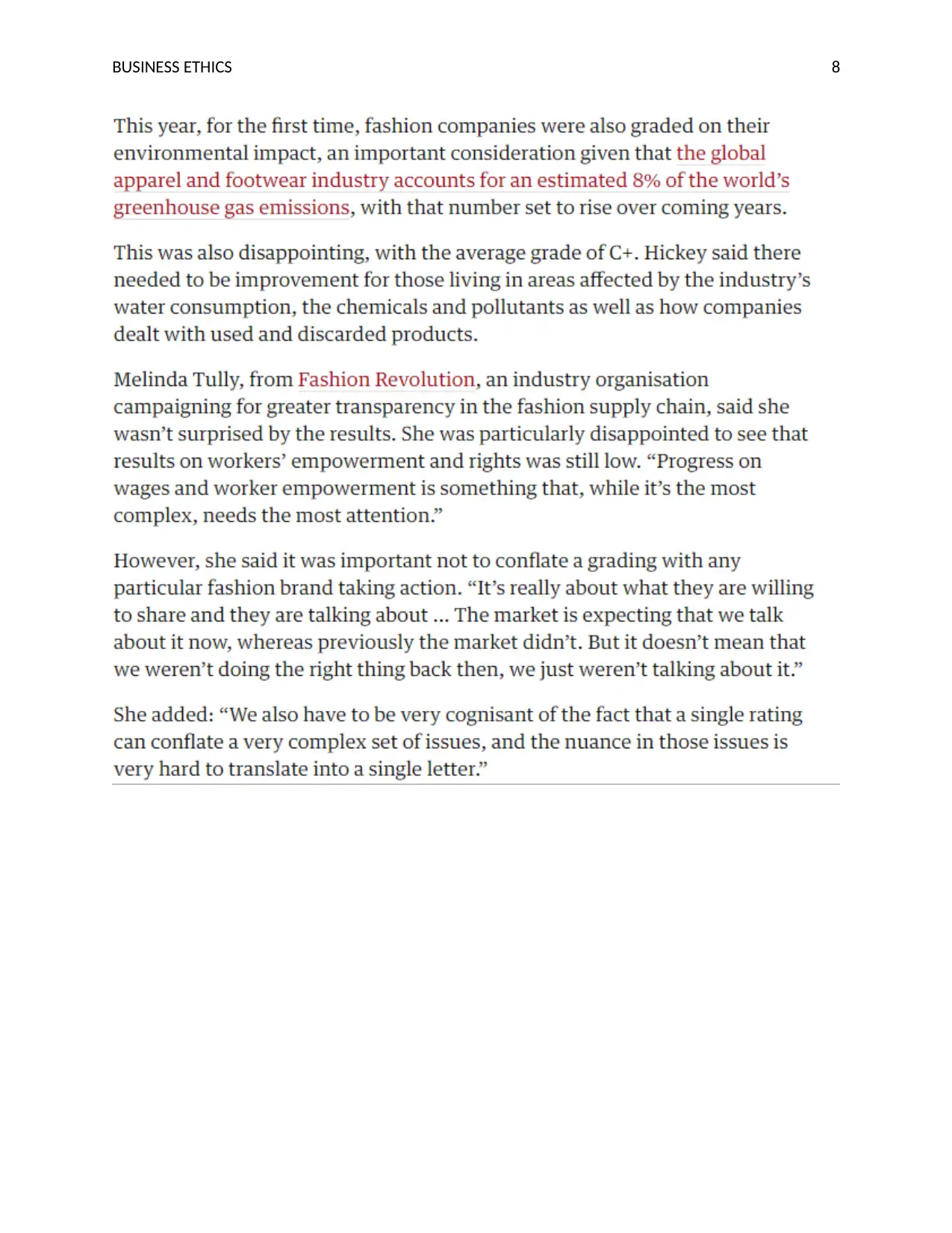
BUSINESS ETHICS 8
⊘ This is a preview!⊘
Do you want full access?
Subscribe today to unlock all pages.

Trusted by 1+ million students worldwide

BUSINESS ETHICS 9
1 out of 10
Related Documents
Your All-in-One AI-Powered Toolkit for Academic Success.
+13062052269
info@desklib.com
Available 24*7 on WhatsApp / Email
![[object Object]](/_next/static/media/star-bottom.7253800d.svg)
Unlock your academic potential
Copyright © 2020–2026 A2Z Services. All Rights Reserved. Developed and managed by ZUCOL.





